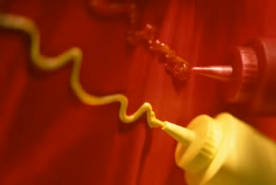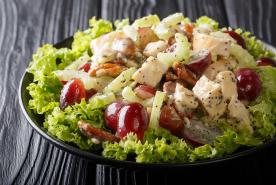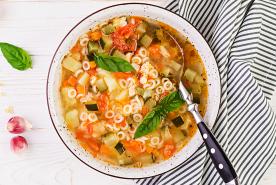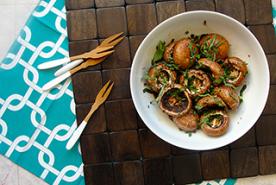Poor growth and appropriate weight gain are two major nutrition problems for children with kidney failure, so diet is individualized for each child and usually not restricted unless needed. Children grow fastest during the first two years of life. The earlier the age at which kidney disease occurs, the more likely growth will be affected. The goals in feeding a child with kidney disease are to ensure normal growth and protect his/her health as much as possible. When the kidneys are not working well, they may not be able to get rid of waste products from foods in the diet. Your healthcare professional and kidney dietitian will watch for signs of problems and suggest a diet if needed.
Does my child need to be on a special diet?
The diet must meet your child’s nutritional needs. Your kidney dietitian has been trained to help you make meal plans to meet your child’s needs. Your kidney dietitian will provide individual counseling and offer helpful suggestions, which take into account your child’s food likes and dislikes. Your child’s diet may need to be changed depending on:
- How well his/her kidneys work
- If he/she is on dialysis and what kind of dialysis (hemodialysis or peritoneal dialysis)
- If he/she has had a kidney transplant.
Your dietitian will help you and your child understand why changes are needed and how to make the changes. It is important to work closely with your child’s dietitian. Because your child’s appetite may change throughout the course of kidney disease, it is important to remember that understanding and patience provide the best chance of success at meal time.
The nutrients most often affected in kidney disease are:
| Sodium | Potassium |
| Phosphorus | Protein |
| Calories | Fluid |
Balancing these nutrients in a healthy diet can be confusing at first. Not all nutrients need to be changed at once. As kidney function decreases, the diet may need to be changed further.
What diet changes are needed before dialysis?
Before dialysis, few diet changes may be needed. Phosphorus usually is limited at this time, which means less dairy products, processed foods, packaged foods and sodas. Pay close attention to meats and cheeses that may be enriched with these ingredients.
Your child’s appetite may begin to decrease, making it important to encourage him/her to eat. Infants will probably need a special formula to increase calories. Sometimes the amount of fluid your child may drink is limited. You may be making the best efforts at helping your child meet his/her nutritional needs within necessary diet restrictions, but there may be a need to start supplemental “tube feedings” to help your child with chronic kidney disease grow and gain weight properly. Don’t be discouraged if this happens to your child. This does not mean you are a “bad” parent or can’t provide your child with the diet he/she needs. It can be hard for children with chronic kidney disease to find enough foods they are allowed to eat and that they actually like. In most cases, once tube feedings are started, some of the struggles that you face with your child's eating happen less often. Over time, be sure to look out for symptoms of nausea and vomiting in your child as their kidney function starts to decrease. These are common symptoms and you should let his/her healthcare provider know.
Although your child may be meeting his/her nutritional needs adequately, it is common for children with chronic kidney disease to be much shorter than other children of the same age. Therefore, it is sometimes necessary to consider the use of recombinant growth hormone to optimize your child’s growth. This requires a shot daily or weekly to stimulate improved growth. Talk with your child’s healthcare professional and/or kidney dietitian about any concerns you may have about your child’s height.
Before starting dialysis, your child with kidney disease may also need extra iron and erythropoietin stimulating agent (or ESA) to treat the anemia that is often seen in patients with chronic kidney disease. When children are anemic or have “low blood counts,” this can affect their energy level and appetite. It is important to treat this so your child will have more interest in eating.
What diet should be followed with peritoneal dialysis?
With peritoneal dialysis, your child needs to eat more protein and limit some high phosphorus foods and high sodium (salt) foods. Since most high-protein foods (dairy products and meats) are also high in phosphorus, your dietitian will help you choose foods to use. Usually, there is no need to limit potassium or fluid. Your child will need a special vitamin supplement made for people on dialysis to replace the vitamins lost during dialysis. Infant formula may need to have extra protein or calories added to it.
Children on peritoneal dialysis may not have a good appetite. The extra fluid in the abdomen) (belly can make them feel full. Your dietitian may suggest high protein, high-calorie supplements, and frequent, small meals.
What restrictions are needed on hemodialysis?
The following are usually restricted on hemodialysis:
- Sodium (canned, processed/packaged foods and table salt)
- Potassium (found in many vegetables and fruits)
- Fluid (anything that is liquid at room temperature)
- Phosphorus (found in processed/packaged foods, dairy products, and meats)
With hemodialysis, your child needs to eat more protein. Your dietitian will tell you what to feed your child based on his/her needs and blood tests. Your child will need a special vitamin supplement made for dialysis patients. Your child’s appetite may change from time to time. Regular eating times and snacks are needed so your child will eat enough calories.
What happens after a kidney transplant?
Within the first few weeks after transplantation, you may notice that your child is feeling better and that his/her appetite has improved. If the new kidney is working well, a healthy, balanced diet with “no added salt” (no salt added to cooking or at the table and avoiding very salty foods such as chips, pickles, canned soup, etc.) will be helpful. With successful transplantation, your child’s diet returns to normal. It is important, however, to focus on foods low in saturated or trans-fat, simple sugars and cholesterol. Extra calories and/or protein are usually not needed after returning home from the hospital. Your infant or child on a tube feeding may be placed on regular formula.
With a less restrictive diet, improved appetite and medications which can also increase appetite, it is common for children with a new kidney to gain excessive amounts of weight. It is important to work with your kidney dietitian to help your child find and keep a healthy weight. Encourage your child to be physically active (check with your child’s healthcare professional about any needed restrictions in activity) and to choose a healthy diet. If dialysis is still needed after a transplant, your child may need to return to their previous diet.
Long-term goals of your child’s diet post-transplant include managing weight gain, blood pressure, blood sugar, blood fats, and maintaining mineral balance for bone health. Your kidney dietitian will continue to play an important role in your child’s ongoing medical care.
Looking for nutrition guidance? Contact a CKD dietitian in your area.
Reviewed by the Council on Renal Nutrition: April 2019
If you would like more information, please contact us.
© 2019 National Kidney Foundation. All rights reserved. This material does not constitute medical advice. It is intended for informational purposes only. Please consult a physician for specific treatment recommendations.

















